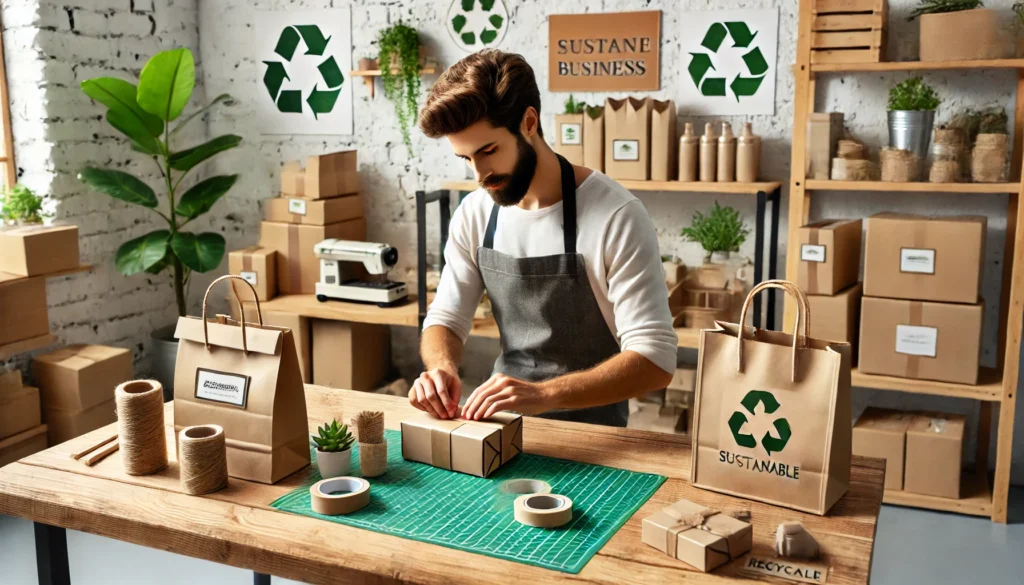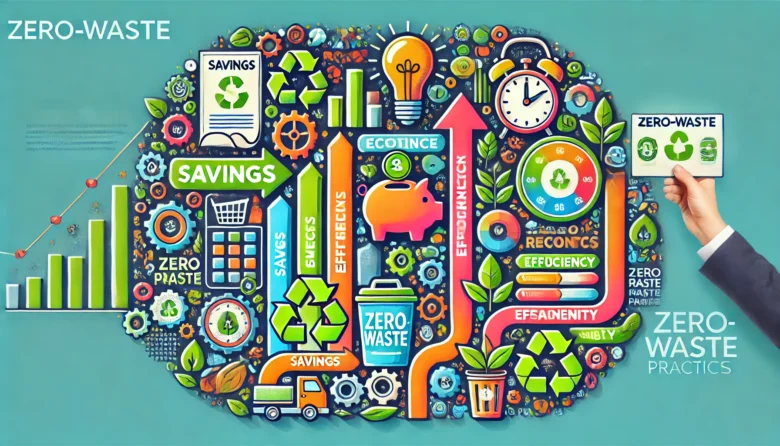Fun fact: Did you know that companies implementing zero-waste strategies can save up to 95% on waste disposal costs?
In today’s world, the drive to reduce environmental impact is stronger than ever, and businesses are taking the lead. One increasingly popular approach is the zero-waste business model. While it may sound like a lofty goal, zero-waste strategies not only help the environment but can also significantly boost a company’s financial health. Let’s dive into how businesses can save money, boost efficiency, and enhance their brand reputation by adopting a zero-waste model.
What is a Zero-Waste Business Model?
Before we explore the financial benefits, it’s important to understand what a zero-waste business model entails. At its core, a zero-waste approach seeks to minimize waste at every stage of the business process—design, manufacturing, distribution, and end-of-life disposal. The goal is simple: prevent anything from being sent to landfills or incinerators. Instead, materials are recycled, reused, or composted.
Financial Benefits of Zero-Waste Business Models
Reduced Waste Disposal Costs
One of the most immediate financial benefits businesses experience from adopting a zero-waste model is the reduction in waste disposal costs. The less waste a business produces, the less it spends on getting rid of that waste. The savings can add up to thousands of dollars annually, varying based on the company’s scale and how much waste they used to produce.
Take Unilever, for instance, a global consumer goods company. By working toward its zero-waste goals, Unilever has reduced its waste disposal costs by a significant margin. The company achieved zero waste to landfill status in over 600 of its sites across the world, saving millions annually on waste management expenses.

Increased Efficiency and Resource Optimization
A zero-waste approach often requires businesses to rethink how they use materials and resources. This can lead to more efficient processes and better resource allocation, both of which reduce costs. Companies become more strategic with raw materials, opting for reusable, recyclable, or compostable options. This not only minimizes waste but also reduces the need to purchase additional materials.
Toyota, one of the largest automakers in the world, exemplifies this. By adopting lean manufacturing principles that focus on waste reduction, Toyota has saved millions in production costs. The company strives to optimize the use of every material, ensuring that nothing goes to waste while also delivering high-quality vehicles to customers.
New Revenue Streams
One of the less obvious benefits of a zero-waste model is the creation of new revenue streams. Waste materials, instead of being discarded, can be repurposed, sold, or turned into something new. For example, excess fabric from the textile industry can be used to create new products or sold to companies that specialize in upcycling.
Patagonia, the outdoor clothing and gear company, is a prime example. Through its Worn Wear program, Patagonia encourages customers to trade in their used clothing, which the company then refurbishes and resells. This not only reduces waste but also creates a new income stream from products that would otherwise end up in landfills.
Enhanced Brand Reputation and Customer Loyalty
Today’s consumers are more eco-conscious than ever. Businesses that embrace zero-waste practices often see a boost in their brand reputation, which can translate into increased sales and customer loyalty. By aligning with consumers’ values, companies that focus on sustainability can attract a growing market of environmentally-conscious customers.
Consider IKEA, a multinational furniture retailer, which has committed to becoming a fully circular business by 2030. IKEA’s zero-waste initiatives have resonated with customers who care about sustainability, helping the company strengthen its reputation as an eco-friendly brand. This, in turn, has led to stronger customer loyalty and increased sales, as consumers prefer to support businesses that align with their values.
Tax Incentives and Government Grants
Governments frequently provide tax breaks and grants to companies that implement eco-friendly practices, such as zero-waste approaches. These financial benefits can help offset the costs of transitioning to a more sustainable business model. From tax credits for recycling efforts to grants for implementing energy-efficient technologies, businesses can benefit from government support while reducing their environmental impact.
In India, for example, the government provides various incentives for businesses that invest in clean energy, waste reduction, and resource efficiency, making the shift to zero waste not just environmentally responsible but financially smart.
Real-World Case Studies
Unilever: A Global Leader in Zero Waste
Unilever, a global consumer goods giant behind brands like Dove and Lipton, has become a trailblazer in zero-waste practices, achieving zero landfill waste across more than 600 of its manufacturing sites worldwide. This accomplishment has saved Unilever millions of dollars in waste disposal fees while also enhancing its brand reputation as a sustainability pioneer. By reducing waste, optimizing resource use, and finding innovative ways to repurpose materials, Unilever demonstrates how a zero-waste approach can lead to substantial financial savings.
Interface: Revolutionizing the Flooring Industry
Interface, a global manufacturer of modular flooring, adopted a zero-waste goal over two decades ago. The company’s Mission Zero initiative set out to eliminate waste and harmful emissions from its production processes. By switching to recycled materials and rethinking its manufacturing processes, Interface has saved millions on raw materials and waste disposal. The company has also seen a marked increase in customer loyalty as consumers seek out environmentally responsible businesses.
Conclusion: The Future is Zero Waste
As more businesses recognize the financial benefits of zero-waste strategies, it’s becoming clear that this is more than just a trend—it’s the future of sustainable business. By reducing waste, companies can lower costs, create new revenue streams, boost brand reputation, and even benefit from government incentives. Moreover, adopting a zero-waste model isn’t just good for the planet; it’s also good for business.
So, whether you’re a small business or a global corporation, the financial case for going zero-waste is undeniable. Start small, focus on reducing waste where you can, and explore ways to repurpose materials. The savings will follow.
Author’s Note:
As businesses continue to evolve in the face of climate change and resource scarcity, zero-waste models are proving to be not just an ethical choice but also a profitable one. I encourage companies of all sizes to explore how adopting zero-waste practices can lead to significant financial and environmental gains.
G.C., Ecosociosphere contributor.
References and Further Reading:
- From Traditional Textiles To Advanced Fiber Reinforcements | Textile World. https://www.textileworld.com/textile-world/features/2018/03/from-traditional-textiles-to-advanced-fiber-reinforcements/
- Does Outsourcing IT Needs Reduce Overall IT Costs? – ePub Zone. https://www.epubzone.org/does-outsourcing-it-needs-reduce-overall-it-costs/
- Patagonia Aims for September Opening – Alexandria Living Magazine. https://alexandrialivingmagazine.com/business/patagonia-aims-for-september-opening/
- ikea_introduces_a_monster_ad_promoting_its_sustainability_efforts_709. https://the-message.ca/2019/09/19/ikea-introduces-a-monster-ad-promoting-its-sustainability-efforts/
- Financial Benefits of Renewable Energy and Sustainable Practices for Business Owners. https://www.michaelrcronin.com/post/financial-benefits-of-renewable-energy-and-sustainable-practices-for-business-owners
- Biden’s Climate Plan | Business Implications | Workiva Carbon. https://www.sustain.life/blog/business-and-biden-climate-plan




